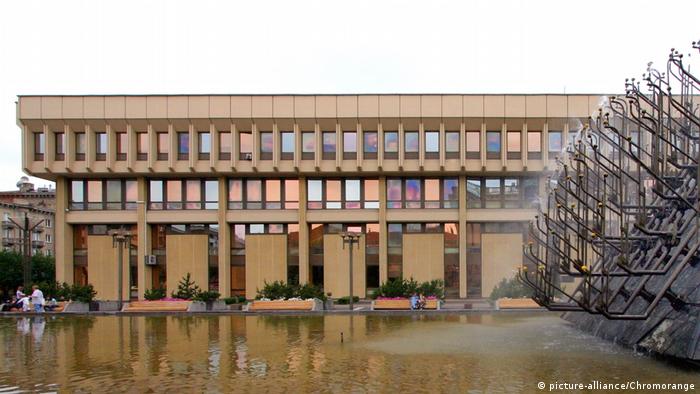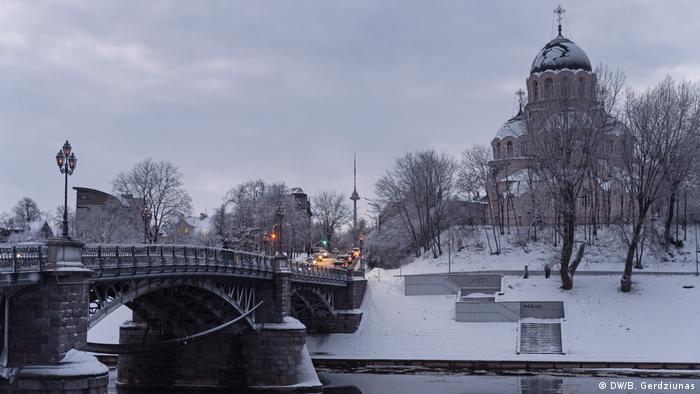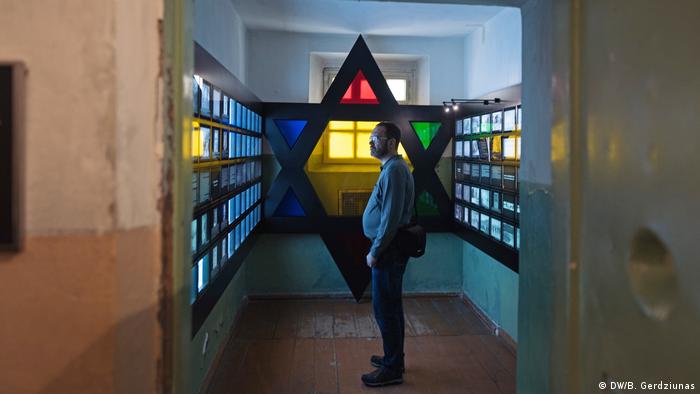The Lithuanian legislators want to make media reports, the “promote distrust of the state”, under penalty. Critics fear that this equating of journalism with Russian Propaganda.

A small child cries in front of the Lithuanian Parliament: “Davai, Davai, Davai,” and pulling his mother behind him. The Russian word that translates freely, “Come on!” is, in colloquial Lithuanian common and is often used by athletes on television. The child’s mother responds: “there is no such word in Lithuanian!”
The small scene on the snowy way reflects what some describe as a childish fight against Russian disinformation in the Baltic country. Instead of the Problem – the deliberate false information – address self-banished, the ruling majority only on the topic from the public discourse, says Dainius Radzevicius, Director of the Lithuanian journalists ‘ Union (LZS).
11. January 2018 decided by the majority of the Parliament, under the leadership of the populist party “Confederation of farmers and the Green” measures to eliminate critical information from the public discourse. That was the day before the anniversary of the struggle for independence from the Soviet Union. In 1991, 14 people were killed that day, hundreds were injured.
The draft law calls for, “to make Experiments” in the media, under the penalty, “to distort the historical memory of Lithuania”, to “promote mistrust of the Lithuanian state and the institutions” and “to reduce the will of the society for the defense of the Nation”, and contains many ambiguous terms.
Was justified in the draft law, EU-directives on audiovisual media services in Lithuanian law.
Kremlin threat to political tool
Ausrine Armonaite is one of the opponents of the law. “This bill deals with the Propaganda of the Kremlin as well as investigative journalism,” says the 29-Year-old Deputy, to, in the future, are at the forefront of a new liberal party. Armonaite explained that it was about the twelfth Time that the government go against freedom of expression. The proposed Changes have been partially torn out of context – from the national security strategy of Lithuania. The resulting design reflects, however, neither the EU Directive nor the security policy document.

Ramunas Karbauskis, since 2019, the peasant party
The majority “chooses the easiest way, by choosing a General formula and all that is contained therein, prohibits” says Radzevicius of the Union of journalists. “There are no legal definitions of ‘suspicion’ towards state institutions, and the prohibition of ‘distortions of the historical memory’ is very dangerous for the freedom of expression. Because the memory is a constantly evolving process.”
Ramunas Karbauskis, Chairman of the Union of farmers and Greens, claimed that the bill would help to protect the upcoming presidential elections in may, in front of the wrong information. But the proposals, Radzevicius, “have nothing to do with elections or fake news.”
Restriction of independent media
Despite innovative campaigns to combat false news and regional disinformation Lithuania’s parliamentary majority has used the Russian threat to open discourse and the independence of the media limit. The pretext of the “protection in front of the Kremlin” is now used to obstruct “the work of journalists in Lithuania”, – said the Chairman of the liberal movement, Eugenijus Gentvilas.

Vilnius TV tower in the Background
In the past year, a parliamentary Commission, including the Karbauskis has begun LRT with the investigation of public broadcasting. This investigation took place, after Lithuanian media, including LRT, investigated charges of corruption against the Chairman and his party. At the same time, Parliament limited the Public’s access to data on land ownership and business ownership, which had been journalists before. “There are people who fear that the Pro-Russian Propaganda could make use of this data,” said Sarunas Cerniauskas, investigative journalist at 15min.lt, a prominent Lithuanian media platform.
In 2016, the conservative majority had tried to prohibit criticism of public figures. The law was later rejected by President Dalia Grybauskaite with a Veto.
The Lithuanians consider Russia as a threat. Lithuanian populists use these Fears to foment distrust of the media. “The threat by the Kremlin in Lithuania is real, and any sensible political party sees them,” said Armonaite, “but if they [the ruling majority] would you look at it from the point of view of human rights and freedom of the press, would not have made such changes in the law in the context of the current threats”.
Distortion of historical memory
The criminalization of the “Attempt to distort the historical memory” refers to the period from 1940 to 1991, when the Baltic States were part of the Soviet Union. Some people of the older Generation still believe that the three Baltic Nations, the USSR voluntarily joined. The Russian television in Lithuania, strengthened this narrative, and spreading conspiracy theories about the independence.

A man in the genocide Museum in Lithuania’s capital, Vilnius
The bill contains no legal remedies to combat the disinformation from abroad. He, however, could bring the political discussion about the Lithuanian involvement in the Holocaust and the anti-Soviet resistance, which today in large Parts of the Baltic taboo subjects, to be Silent.
“I’ve always been against that, historians want to dictate which truth is to be found,” said Terese Birute Burauskaite, Director of the publicly funded research centre for genocide and resistance in Lithuania. “The goal is to have discussions,” she added.
In accordance with Russia
Meanwhile, the Opposition presented a counter-proposal to the deletion of the ambiguous terms from the draft, and negotiations on the bill should begin soon. It is unclear when a final vote will take place.
Meta Adutaviciute and Erika Leonaite from the Human Rights Monitoring Institute in Vilnius criticize the proposed law. “If you focus only on the threat by the Kremlin and no proper understanding of human rights has, to get such results,” said Adutaviciute.
In her six years at the Institute Leonaite has seen “never, that a Parliament has taken many initiatives, the freedom of the media to restrict”.
Despite the hopes of Lithuanian politicians, diplomats, and NGOs that your country is taking a leading role in the fight against disinformation, seems to be the Parliament to go the same route as Russia. In January began the Russian legislature to make fake messages and criticism of the state under penalty.